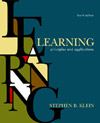| acoustic attribute | The acoustic properties of an event, which serve as a retrieval cue for that experience.
|
 |
 |
 |
| affective attribute | The mood state present during an event, which can serve as a memory attribute of that experience.
|
 |
 |
 |
| class associative attribute | The category name of a word that can serve as the memory attribute for the word.
|
 |
 |
 |
| context attribute | The context in which an event occurred, which can be a retrieval cue.
|
 |
 |
 |
| decay of forgetting view | The view that forgetting is due to the fading or erasure of a memory.
|
 |
 |
 |
| directed forgetting | The forgetting of an event following the presentation of the "forget cue."
|
 |
 |
 |
| engram | The physical representation of an event in a person's memory.
|
 |
 |
 |
| false memory syndrome | The creation of an inaccurate record of childhood sexual abuse.
|
 |
 |
 |
| forgetting | The inability to recall a past experience.
|
 |
 |
 |
| frequency attribute | The frequency of an event, which can be a retrieval cue.
|
 |
 |
 |
| generalized competition | A temporary tendency (or set) to respond with most recent learning.
|
 |
 |
 |
| interference | An inability to recall a specific memory due to the presence of other memories.
|
 |
 |
 |
| Kamin effect | The poor retention of a prior aversive experience or an intermediate retention test (1 to 4 hours after training) but good recall either immediately or 24 hours later.
|
 |
 |
 |
| list differentiation | An ability to distinguish between memories, reducing the level of interference.
|
 |
 |
 |
| memory attribute | A salient aspect of an event whose presence can lead to retrieval of the past event.
|
 |
 |
 |
| memory reconstruction | The alteration of a memory to provide a consistent view of the world.
|
 |
 |
 |
| modality attribute | Information about the sensory modality through which an event was experienced.
|
 |
 |
 |
| natural language mediator | The use of a word to mediate the association of two unrelated verbal units.
|
 |
 |
 |
| orthographic attribute | The feature properties of an event, which serve as a memory attribute.
|
 |
 |
 |
| parallel associative attribute | Associations that are based on equality (synonyms), opposition (antonyms), or functional contiguity.
|
 |
 |
 |
| proactive interference (PI) | The inability to recall recent experiences as a result of the memory of earlier experiences.
|
 |
 |
 |
| repressed memory | A process that submerges a memory into the unconscious to minimize anxiety and protect the self-concept.
|
 |
 |
 |
| retroactive interference (RI) | The inability to recall distant events because of the memory of more recent events.
|
 |
 |
 |
| spatial attribute | The spatial location of an item, which can serve as a memory attribute.
|
 |
 |
 |
| state-dependent learning | Learning based on events experienced in one state; the events will not be recalled if the subject is tested in a different state.
|
 |
 |
 |
| temporal attribute | The time that an event occurred, which can be a retrieval cue for that experience.
|
 |
 |
 |
| transformational attribute | A transformed or altered event that can serve as a memory attribute for that experience.
|
 |
 |
 |
| two-factor theory of interference | Melton and Irwin's idea that competition between memories causes PI and RI and that unlearning leads to RI.
|
 |
 |
 |
| verbal associative attribute | An attribute of a word that can act as a retrieval cue.
|



 2002 McGraw-Hill Higher Education
2002 McGraw-Hill Higher Education